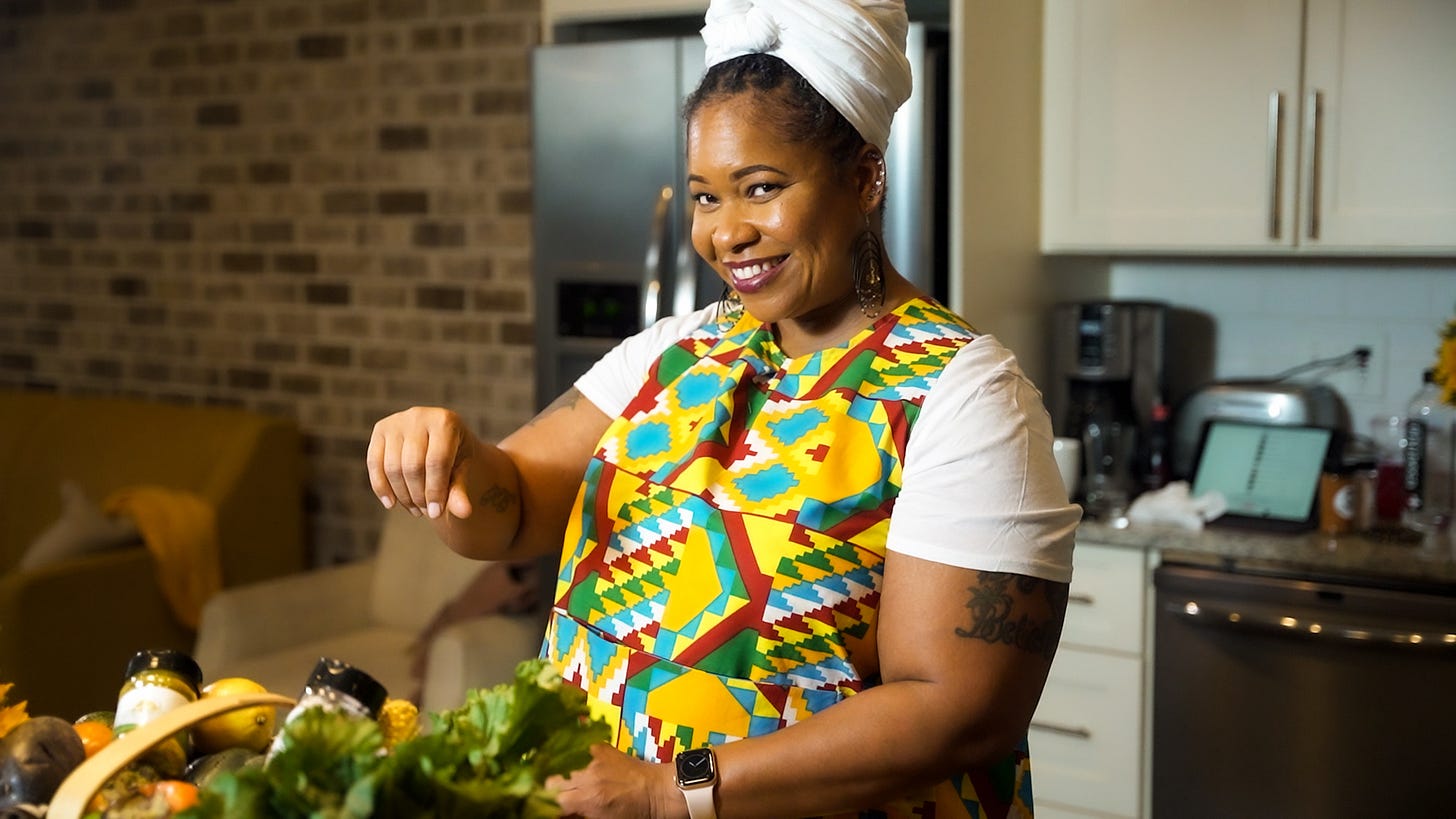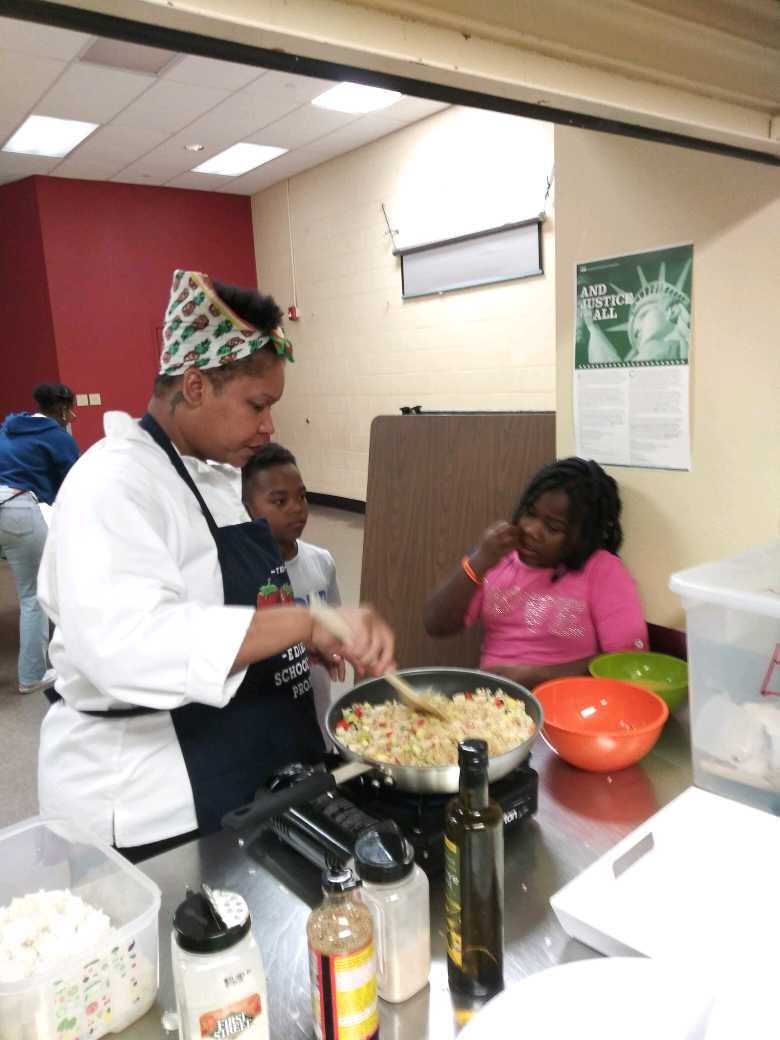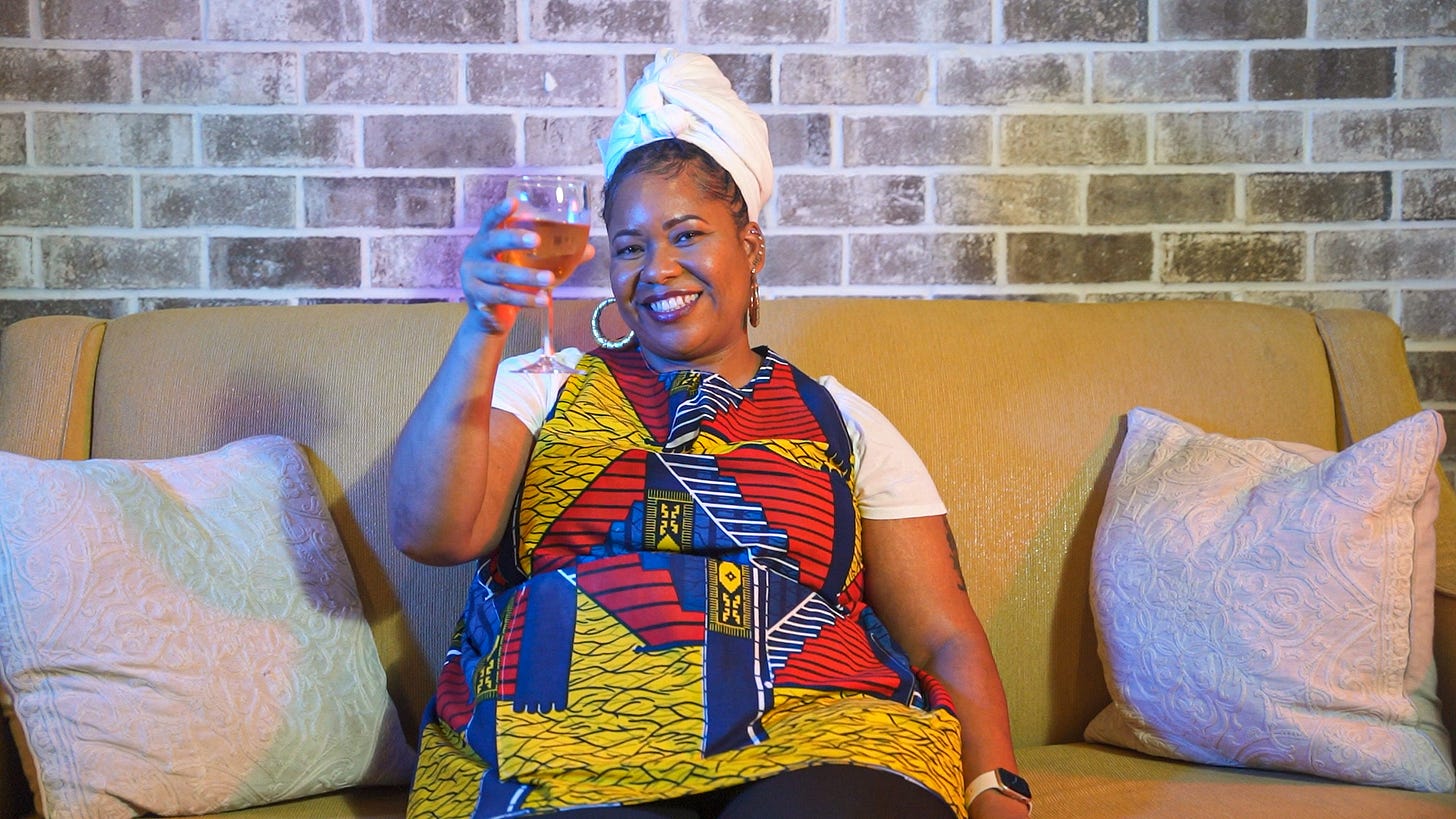Order Up! A Conversation with Chef Liesha Mckinley-Barnett, Director of the African Diaspora Foodways at Clemmons Family Farm
Honoring Black History Month by teaching our kids (and ourselves!) about food justice, wellness, and community impact.
Small Bites:
This Black History Month, we’re bringing you interviews with African American chefs at the intersection of food, sustainability, and social justice - and they are parents, too! Subscribe to our first guest, , on Substack
🍴 Shop delicious food from award-winning African-American Chefs for Black History Month from Goldbelly - ships Nationwide!
🚜 Donate to support the Clemmons Family Farm, a 501c3 Vermont non-profit organization. Only 0.4% of all farms in the U.S. are Black/African-American owned.
🔪 Knife Skills Now - eCourse from Kids Cook Real Food
🥔 One Potato is a reader-supported newsletter - paid subscribers have access to the full archive of Recipes and Specials Interviews and Community Voices for $5/month or $45/year. This first interview of the month is available for ALL subscribers.
As we kick off Black History Month, we’re honored to feature Chef Liesha Mckinley-Barnett, whose work bridges history, culture, and sustainability. For Chef Liesha, food is a powerful way to connect people and build a healthier, more just world. With over 25 years of culinary expertise and a deep commitment to food justice, Liesha brings families together one meal—and one lesson—at a time.
Liesha is the Director of the African Diaspora Foodways Institute at the Clemmons Family Farm in Charlotte, Vermont. This remarkable 138-acre landmark, part of the Vermont African American Heritage Trail, is a living testament to the Clemmons elders' vision of celebrating Black heritage through food, art, and community. By integrating the history of African American and African Diaspora foodways into educational programs, the farm empowers families to connect with their roots and explore sustainable, nutritious eating. (Keep an eye out for next week’s Tuesday newsletter, where we’ll be sharing even more educational information about Black-owned farms in the United States for Black History Month.)

In our conversation, Liesha reflects on her journey from childhood food insecurity in Oakland to becoming a chef, educator, and advocate for food sovereignty. Liesha’s work centers on more than just recipes—she’s all about empowering communities to take charge of their well-being while fostering a love for cooking that’s as practical as it is joyful.
We talked about everything from bridging cultural traditions and dietary needs to teaching kids to try new foods (hint: it starts with trust) and the one skill every home cook should master (eggs, anyone?). Liesha’s wisdom is rooted in her belief that food is both personal and universal—a tool to nurture health and families at home, and create a better future for kids and communities, one meal at a time.
A yummy note from Goldbelly:
Honoring Black History Month: Celebrate Black Food Makers 👩🏾🍳
As a community of American food lovers & food makers, we have a deep gratitude for the influence African American culture has had on U.S. regional food. From icons like Chef Carla Hall in Washington, D.C. to small, independent bakers, like Nikki J's Cakes down in Texas, Goldbelly delivers the most epic eats crafted by Black food makers right to your door.
These chefs are cooking up everything from BBQ to pasta to red velvet cake and ice cream - you’re sure to find something to satisfy any craving. Check out the options for a special family treat.
Order now and support Black chefs: Shop Black Food Makers on Goldbelly 🔪
Introduce Yourself: My name is Liesha McKinley-Barnett. I’m a food activist, nutritionist and educator, grower and a chef with over 25 years of experience. I’m also a mom with two adult kids.
Let’s start at the beginning. What inspired you to become a chef, and how did food justice and food activism become part of your path?
Becoming a chef wasn’t something I planned. Growing up in Oakland, we experienced food insecurity, so we didn’t eat out or have fast food. My mom cooked breakfast and dinner every day, and when she couldn’t, my dad would step in, often making weekend meals. I’d watch both of them navigate the kitchen and join my mom on grocery trips. I was also obsessed with cooking shows on PBS—Julia Child, Jacques Pépin, and others. My dad would mimic their moves in the kitchen, which was hilarious, and that sparked my curiosity to experiment with cooking. By the time I was 10, I started playing around in the kitchen myself.
Fast forward to high school, I faced the usual senior year panic of “what’s next?” College didn’t seem like an option because of my test anxiety, but then a Navy recruiter came to my school, and I decided to join the Navy as a cook.
After the Navy, I pursued a culinary degree and later decided to study nutrition. That’s when I started connecting the dots between food insecurity and systemic issues. Sitting in classes with peers who had never experienced hunger or understood the challenges marginalized communities face really lit a fire in me. I realized I wanted to use my knowledge to help others in my community.
My work with kids began when my daughter was in Girl Scouts, and her troop leader asked me to teach the girls how to cook. Over the years, I noticed how capable kids are in the kitchen when we trust them. It’s all about giving them the right tools and guidance, like teaching knife skills while closely supervising.
Shifting my focus to kids wasn’t just about teaching—it was also about stepping away from the toxic environments of the culinary industry. Missing holidays and special moments with my family pushed me to rethink my career. My big breakthrough came when I started working with the Edible Schoolyard Project, founded by Alice Waters.
A little explanation might be helpful for our readers - What is the Edible Schoolyard Project?
The Edible Schoolyard Project was created by Chef Alice Waters in Berkeley, California, at Martin Luther King Jr. Middle School. Alice, known for pioneering the farm-to-table movement and seasonal cooking, transformed a concrete yard into a thriving garden. The program integrates food into education, connecting science and social studies to cooking and gardening. For example, students might learn about Chinese history while making fried rice.
When former Stockton Mayor Michael Tubbs wanted to bring the program to his city, I led the charge. We started with a single after-school cooking class, then expanded to running a six-acre farm where I taught over a thousand students a year how to grow and cook their own food. It’s been an incredible journey to help kids connect with food and develop skills they can carry for life.
Since we’re talking about access to fresh vegetables - transforming concrete into a garden - that brings up our next question about food access and food justice. How can families contribute to food justice in their daily lives and communities? Does this mean shopping local or donating?
The most impactful way families can contribute to food justice might be unexpected: it starts with education and awareness. Teaching your children, nieces, nephews, and community kids about food access and privilege is key. It’s not just about shopping at farmers' markets or donating, though those are great actions. It’s about helping the next generation understand that not everyone has equal access to food—and that privilege plays a significant role in this.
When families acknowledge their privilege, they can shift from a “moral hierarchy” mindset to one focused on systemic change. For example, instead of just donating or buying local, consider how we prepare young people to engage with food justice in meaningful ways. Encourage them to think about careers in law, environmental science, nutrition, or social work—all areas where food justice plays a critical role.
It’s also important to give kids the language to understand these issues. Teach them about food sovereignty, wellness, and community impact. If families focus only on short-term actions like donating money, they risk raising another generation that believes throwing money at problems is enough. Real change comes from deeper engagement, advocacy, and education.
Attending food justice events—like summits or virtual meetings—can also open your eyes to what’s happening locally. Organizations like 4-H, for instance, often support initiatives tied to food preservation. Even something as simple as canning summer beans to eat during winter can be transformative for rural communities where fresh food isn’t available year-round. Understanding and participating in these efforts can make a real difference in tackling food insecurity and creating sustainable change.
We share a lot of recipes with our readers here at One Potato. How can parents honor and integrate cultural food traditions while ensuring meals are nutritious and accommodating of dietary needs?
A great starting point is to seek out recipes and guidance from creators who belong to the cultures you’re exploring. Instead of relying on platforms like Pinterest, where authenticity can be questionable, follow Thai, Indian, Ethiopian, or other cultural chefs and creators. This ensures you’re not only learning directly from those who understand the traditions but also supporting their communities.
You might be surprised to discover that many traditional dishes are naturally rich in vegetables, fruits, whole grains, and other nutritious ingredients. Often, it’s the Americanized versions of these recipes that lose those wholesome elements.
For families with dietary restrictions, like gluten-free or allergen-sensitive diets, modifications will be necessary, but they don’t have to detract from the cultural essence of the dish. Exploring international markets to source authentic ingredients can also turn this process into a fun and educational cultural experience for the whole family.
Ultimately, embracing these traditions isn’t just about food—it’s about connecting with diverse cultures in a meaningful, nourishing way.
You have tons of experience as a chef and as an educator. When teaching kids of all ages to cook, what are some strategies to help picky eaters try new foods and flavors?
One of my favorite strategies is building trust through shared experiences. I’ll have the kids make me try something they love—often a snack or treat adults might overlook. For example, I’ve tried Takis at their suggestion, even though - ugh - I didn’t enjoy it. But I survived, and they saw me give it a fair shot. That becomes a bartering tool: “I tried your snack, so now it’s your turn to try this Brussels sprout.” It’s a fun and even exchange that fosters trust.
Another key strategy is persistence. Just because a child doesn’t like something one way doesn’t mean they’ll never like it. My son, for instance, called everything “chicken” until he was almost 10. He didn’t like fish, shrimp, or anything spicy back then. Now, at 16, he enjoys teppanyaki and tries all kinds of new foods.
It’s also important to communicate and adapt. There was a time when my kids suddenly stopped eating broccoli, which used to be their favorite vegetable. I asked them about it, and after some sibling telepathy, they finally told me, “It’s mushy.” I realized I was still cooking it soft, like I did when they were younger. Once I adjusted—roasting or sautéing it instead—they started eating broccoli again.
The lesson? Keep experimenting, ask questions, and make it a safe space for kids to share what they like or don’t. This is where family meal times, spending time together at the table, and communication all play a role. Even small tweaks, like skipping onions or peppers, can make a big difference. Listening and adapting go a long way in helping kids explore new foods and flavors.
Last but not least - our favorite One Potato question. What’s a chef-approved cooking skill that you think every home cook should practice or know?
Eggs. Hands down, learn how to cook eggs in a variety of ways. They’re one of the most versatile ingredients out there and can work for breakfast, lunch, or dinner. Eggs rarely take long to cook, they’re an excellent protein source, and even some vegetarians include them in their diet.
Take a frittata, for example—it’s super easy to make, endlessly customizable, and can double as breakfast or dinner. Make a pan of it, and you’ve got two days of breakfasts ready to reheat. For dinner, just pair it with a simple salad, and you’re good to go.
I recommend mastering basics like a solid omelet, frittata, or other egg-based dishes. Once you’ve got those down, you’ll have a quick, filling, and flexible option for just about any meal. Plus, it’s a great way to use up odds and ends from your fridge. Eggs are a home cook’s secret weapon!







